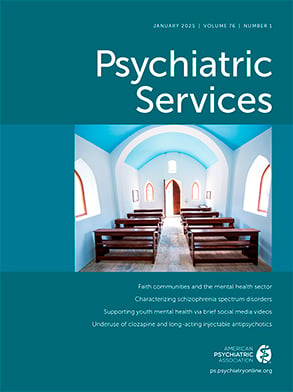This Month's Highlights
Empirical Support for the Family-to-Family Program
Can ACT Reduce Disparities in Service Use?
IMR for Persons With Schizophrenia
Potential Disparities in Schizophrenia Management
Information & Authors
Information
Published In

History
Authors
Metrics & Citations
Metrics
Citations
Export Citations
If you have the appropriate software installed, you can download article citation data to the citation manager of your choice. Simply select your manager software from the list below and click Download.
For more information or tips please see 'Downloading to a citation manager' in the Help menu.
